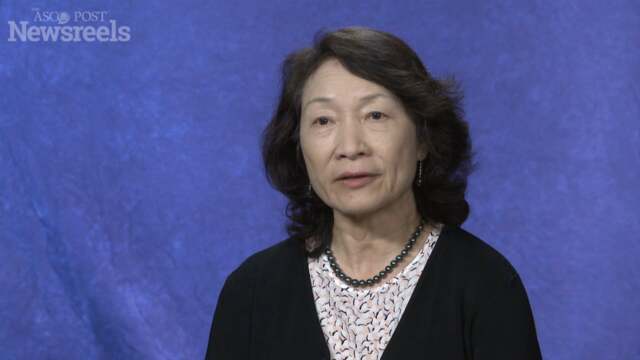MEK Inhibitor Selumetinib and Docetaxel in KRAS-Mutant Advanced NSCLC
A phase III trial (SELECT-1) has shown no improvement in progression-free survival with the addition of the MEK inhibitor selumetinib to docetaxel in the second-line treatment of patients with KRAS-mutant non–small cell lung cancer (NSCLC). Trial results were reported by Jänne et al in...
Brigatinib in Advanced Crizotinib-Refractory ALK-Positive NSCLC
As reported by Kim et al in the Journal of Clinical Oncology, the phase II ALTA trial showed that the next-generation oral ALK inhibitor brigatinib produced a high response rate, including intracranial responses, in patients with advanced crizotinib-refractory non–small cell lung cancer...
ASCO 2017: Gefitinib Treatment Can Delay Recurrence of Intermediate-Stage Lung Cancer
The targeted therapy gefitinib (Iressa) appears more effective in preventing recurrence after lung cancer surgery than the standard of care, chemotherapy. In a phase III clinical trial, patients with epidermal growth factor receptor (EGFR)-positive, stage II to IIIA non–small cell lung cancer ...
FDA Approves Pembrolizumab as First-Line Combination Therapy With Pemetrexed and Carboplatin for Metastatic Nonsquamous NSCLC
On May 10, the U.S. Food and Drug Administration (FDA) approved pembrolizumab (Keytruda), an anti–programmed cell death protein 1 (PD-1) therapy, in combination with pemetrexed (Alimta) and carboplatin for the first-line treatment of metastatic nonsquamous non–small cell lung cancer...
Never Smokers Account for Increased Proportion of NSCLC Cases
In a retrospective study in three U.S. institutions reported in the Journal of the National Cancer Institute, Pelosof et al found that never smokers accounted for an increasing proportion of cases of non–small cell lung cancer (NSCLC) during the period from 1990 to 2013. Joan Schiller, MD, of the...
Gefitinib or Erlotinib vs Chemotherapy in Advanced NSCLC
In an individual patient data meta-analysis reported in the Journal of the National Cancer Institute, Lee et al found no difference in overall survival for first-line treatment with the first-generation epidermal growth factor receptor (EGFR) tyrosine kinase inhibitors gefitinib (Iressa) or...
ELCC 2017: Prospective Study Shows Concordance of EGFR Mutation Detection Between ctDNA and Tumor Samples
Detection of EGFR mutations in circulating tumor (ct) DNA from plasma samples can be accomplished using the cobas platform, according to findings presented by Kumar et al at the 2017 European Lung Cancer Conference (ELCC) (Abstract 95PD). Assays of ctDNA offer a noninvasive method of finding EGFR...
ELCC 2017: Specific Immune Cell Profiles Potentially Identify Patients With Lung Cancer Responsive to Anti–PD-1 Immunotherapy
An investigation of immune cell subtypes in the tumor microenvironment of patients with lung adenocarcinoma and squamous cell carcinoma (SCC) identified an immune subgroup that associates with prolonged patient survival and may be prognostic of response to nivolumab, according to findings presented ...
ELCC 2017: Ensartinib Demonstrates CNS Activity in ALK-Positive NSCLC
Ensartinib demonstrated intracranial responses in patients with anaplastic lymphoma kinase (ALK)–positive non–small cell lung cancer (NSCLC) and central nervous system (CNS) metastases, according to findings presented by Reckamp et al at the 2017 European Lung Cancer Conference (ELCC)...
ELCC 2017: Development and Validation of Lung Toxicity Prediction Models Aids Effective Use of Radiotherapy in NSCLC
Validation using patient data of an outcome prediction model for the development of dyspnea subsequent to radiotherapy revealed that the prognostic factors in the model did not adequately predict for delta toxicity endpoints, according to results reported by Defraene et al at the 2017 European Lung ...
Prognostic and Predictive Effects of TP53 With KRAS or EGFR Mutation Status in NSCLC
In a pooled analysis of four trials of platinum adjuvant therapy vs observation in resected early-stage non–small cell lung cancer (NSCLC), Shepherd et al found no prognostic effect of KRAS or EGFR with TP53 comutation but a potential negative predictive effect for adjuvant therapy with TP53...
Expert Point of View: Ashish Saxena, MD, PhD
After the data were presented, Ashish Saxena, MD, PhD, Assistant Professor of Medicine at Weill Cornell Medical College and Assistant Attending Physician at the NewYork-Presbyterian Hospital, New York, weighed in on the CA209-003 study. “The results of this trial are exciting and give hope to...
Five-Year Survival Quadrupled in Responders to Immunotherapy for Non–Small Cell Lung Cancer
At 5 years, the overall survival rate was 16% in patients with advanced non–small cell lung cancer (NSCLC) treated with single-agent nivolumab (Opdivo), according to follow-up of a phase Ib dose-ranging study (CA209-003), presented at the American Association for Cancer Research (AACR) Annual...
ELCC 2017: Study Shows White Blood Cell–Boosting Drugs Safe During Small Cell Lung Cancer Chemoradiotherapy
A late-breaking subanalysis of the phase III CONVERT trial presented by Gomes et al at the 2017 European Lung Cancer Conference (ELCC) shows that white blood cell–boosting drugs are safe during concurrent chemoradiotherapy of small cell lung cancer (SCLC, Abstract LBA2_PR). “The...
ELCC 2017: Some Patients With Lung Cancer Benefit From Immunotherapy Even After Disease Progression
Some patients with advanced lung cancer benefit from immunotherapy, even after the disease has progressed as evaluated by standard criteria, according to research presented by Artal-Cortes et al at the 2017 European Lung Cancer Conference (ELCC, Abstract 96PD). The findings pave the way for certain ...
ELCC 2017: White Blood Cell Count May Predict Response to Lung Cancer Immunotherapy
White blood cell counts may predict whether patients with lung cancer will benefit from immunotherapy, according to research presented by Tiseo et al at the 2017 European Lung Cancer Conference (ELCC, Abstract 30PD). “Immune checkpoint inhibitors such as nivolumab [Opdivo] and...
ELCC 2017: Osimertinib Improves Symptoms in Advanced Lung Cancer
Osimertinib (Tagrisso) improved cancer-related symptoms in patients with advanced lung cancer, according to an analysis of patient-reported outcomes from the AURA3 phase III clinical trial presented by Lee et al at the 2017 European Lung Cancer Conference (ELCC, Abstract 85O). “With my...
Genomic Intratumor Heterogeneity and Evolution of NSCLC Tumors
In a study reported in The New England Journal of Medicine, Jamal-Hanjani et al found that early stage non–small cell lung cancer (NSCLC) tumors were characterized by widespread intratumor genomic heterogeneity and that increased subclonal copy-number alterations in this context were...
ELCC 2017: Men May Need More Frequent Lung Cancer Screening Than Women
Men may need more frequent lung cancer screening than women, according to research to be presented by Koo et al at the 2017 European Lung Cancer Conference (ELCC). The U.S. Preventive Services Task Force recommends annual screening for lung cancer with low-dose computed tomography (CT) in adults...
ASCO/CCO Clinical Practice Guideline Update: Adjuvant Therapy for Resected Non–Small Cell Lung Cancers
As reported in the Journal of Clinical Oncology by Mark G. Kris, MD, of Memorial Sloan Kettering Cancer Center, and colleagues, ASCO and Cancer Care Ontario (CCO) have issued an update to the ASCO/CCO clinical practice guideline on adjuvant systemic therapy and adjuvant radiation therapy for stage...
FDA Approves Brigatinib for Metastatic ALK-Positive Non–Small Cell Lung Cancer
On April 28, 2017, the U.S. Food and Drug Administration (FDA) granted accelerated approval to brigatinib (Alunbrig) for the treatment of patients with metastatic anaplastic lymphoma kinase (ALK)-positive non–small cell lung cancer (NSCLC) who have had disease progression on or are...
Potential Predictive Biomarker of Response to Crizotinib in Lung Cancer
Although the duration and magnitude of clinical response are unpredictable in patients with ALK-rearranged non–small cell lung cancer (NSCLC) treated with crizotinib (Xalkori), eventually all patients develop resistance to the drug. A study by Pailler et al evaluating whether circulating...
FDA Grants Lorlatinib Breakthrough Therapy Designation for ALK-Positive Metastatic Non–Small Cell Lung Cancer
On April 27, the investigational next-generation ALK/ROS1 tyrosine kinase inhibitor lorlatinib was granted Breakthrough Therapy designation from the U.S. Food and Drug Administration (FDA) for the treatment of patients with anaplastic lymphoma kinase (ALK)-positive metastatic non–small cell...
ELCC 2017: Patients With Lung Cancer Treated With PD-1/PD-L1 Checkpoint Inhibitors May Experience Adverse Events After Influenza Vaccination
Patients with lung cancer treated with programmed cell death protein 1/programmed cell death ligand 1 (PD-1/PD-L1) checkpoint inhibitors may be at increased risk of adverse events after receiving the seasonal influenza vaccination, according to the first study measuring this effect. The results, to ...
Prophylactic Cranial Irradiation vs Observation in Extensive-Disease Small Cell Lung Cancer
A Japanese phase III trial has shown no survival benefit of prophylactic cranial irradiation vs observation in patients with extensive-disease small cell lung cancer who had any response to platinum-based doublet chemotherapy and no brain metastases at baseline. These findings were reported in The...
Adding Bevacizumab to Cisplatin/Etoposide in Extensive-Disease Small Cell Lung Cancer
In an Italian phase III trial reported in the Journal of Clinical Oncology, Marcello Tiseo, MD, of Azienda Ospedaliero-Universitaria, Parma, Italy, and colleagues found that adding first-line bevacizumab (Avastin) to cisplatin/etoposide did not prolong overall survival in patients with...
Stage I Lung Cancer: Treatment Advances Have Changed the Game
Read more in the Journal of Oncology Practice (JOP). Visit ASCOPubs.org/journal/jop Patients with stage I lung cancer are achieving excellent local tumor control, thanks to an evolution in radiotherapy and surgical approaches. Jeffrey A. Bogart, MD, Professor and Chair of the Department of...
Cardiac Events After Radiotherapy for Locally Advanced Lung Cancer
An analysis of patients from 4 prospective radiotherapy trials for locally advanced non–small cell lung cancer (NSCLC) conducted at 2 centers in Michigan showed that grade ≥ 3 cardiac events occurred in more than 10% of patients. The study was reported by Dess et al in the Journal of...
AACR 2017: 5-Year Survival Rate for Nivolumab-Treated Advanced Lung Cancer Higher Than Historical Rate in Early-Phase Trial
Treatment with the immune checkpoint inhibitor nivolumab (Opdivo) yielded durable responses in some patients with advanced non–small cell lung cancer (NSCLC), with a 5-year survival rate of 16%, according to data from a phase I clinical trial presented by Brahmer et al at the American...
FDA Grants Osimertinib Full Approval in Metastatic EGFR T790M Mutation–Positive NSCLC
On March 30, 2017, the U.S. Food and Drug Administration (FDA) granted regular approval to osimertinib (Tagrisso) for the treatment of patients with metastatic epidermal growth factor receptor (EGFR) T790M mutation–positive non–small cell lung cancer (NSCLC), as detected by an...
Assessment of Immunohistochemistry Assays for PD-L1 Expression in NSCLC
In a study of four immunohistochemistry programmed cell death ligand 1 (PD-L1) expression assays registered with the U.S. Food and Drug Administration (FDA), scoring was highly concordant for expression in tumor cells but poorly concordant for scoring in immune cells in non–small cell lung...
3-Year Follow-up of Japanese Trial of Alectinib in ALK-Positive NSCLC
Promising 3-year outcomes were found in patients from a Japanese phase I/II study of alectinib (Alecensa) in previously treated patients with ALK-positive non–small cell lung cancer (NSCLC). The findings were reported by Tamura et al in the Journal of Clinical Oncology. Study Details In the ...
New First-Line Options for ALK-Positive Lung Cancer on the Horizon
Anaplastic lymphoma kinase (ALK) rearrangements define a subset of non–small cell lung cancer (NSCLC) patients for whom ALK inhibitors are highly effective. In PROFILE 1014, the multitargeted ALK inhibitor crizotinib (Xalkori) was shown to be superior to platinum/pemetrexed (Alimta) chemotherapy...
Markedly Improved Progression-Free Survival With First-Line Ceritinib vs Platinum Chemotherapy in ALK-Rearranged NSCLC
In the phase III ASCEND-4 trial reported in The Lancet, Jean-Charles Soria, MD, of Institut Gustave Roussy, and colleagues found that ceritinib (Zykadia) improved progression-free survival vs platinum-based chemotherapy in the first-line treatment of advanced anaplastic lymphoma kinase...
Expert Point of View: Heather L. McArthur, MD, MPH
Discussant Heather L. McArthur, MD, MPH, Medical Director of Breast Oncology at Cedars-Sinai Medical Center, Los Angeles, called the plinabulin findings “provocative,” especially considering the substantial impact on durability of response. Specifically with the addition of plinabulin to docetaxel, ...
Plinabulin Improves Survival in Subset of Patients With Non–Small Cell Lung Cancer
The investigational small-molecule plinabulin yielded some interesting benefits when added to docetaxel in previously treated patients with stage III/IV non–small cell lung cancer (NSCLC), in a phase II study.1 Although the benefit of the doublet was modest in the overall study population, the...
IASLC Endorses Tobacco Reform Report Outlining Progress Toward Ending Adult Cigarette Smoking
The International Association for the Study of Lung Cancer (IASLC) has endorsed a report released by the Core Team for Tobacco Control that outlines key action items that can be taken immediately to accelerate progress toward ending cigarette smoking in adults. Issuing their Executive Summary ...
Expert Point of View: Ann W. Silk, MD
Ann W. Silk, MD, of Rutgers Cancer Institute of New Jersey, New Brunswick, presented the day’s highlights and commented that the study by Hellmann et al shows the utility, and, in fact, the necessity, of developing a new means of estimating outcomes for patients treated with immunotherapies....
Pembrolizumab Affords Long-Term Survival to One-Fourth of Selected Patients With NSCLC, Alternative Statistical Model Suggests
Statistical modeling of long-term survival from the KEYNOTE trials of the programmed cell death protein 1 (PD-1)–inhibitor pembrolizumab (Keytruda) estimates that one-quarter of appropriately selected patients with advanced non–small cell lung cancer (NSCLC) may attain long-term survival.1 “In...
Multikinase Inhibitor Treatment Responses in Patients With RET-Rearranged NSCLC
In a report from the Global, Multicenter RET Registry in the Journal of Clinical Oncology, Gautschi et al documented response rates with multikinase RET inhibitors in patients with RET-rearranged non–small cell lung cancer (NSCLC). Study Details The study involved registry data (through...
Thoracic 2017: SBRT Offers Curative Option for Patients With Lung Cancer Aged 80 and Older
Patients in their 80s and 90s who have early-stage lung cancer but cannot undergo an operation can be treated safely and effectively with stereotactic body radiation therapy (SBRT), according to research presented by Cassidy et al at the 2017 Multidisciplinary Thoracic Cancers Symposium (Abstract...
Thoracic 2017: Updated Data Confirm Benefits of Single-Fraction SBRT for NSCLC
New research led by a radiation oncologist at Roswell Park Cancer Institute indicates that less may be more when it comes to some forms of radiation therapy for cancer. In a presentation highlighted in a plenary session (Abstract 4) at the 2017 Multidisciplinary Thoracic Cancers Symposium in San...
Douglas E. Wood, MD, on Lung Cancer Screening
Douglas E. Wood, MD, of the University of Washington, discusses the importance of broad access to and education about lung cancer screening—now approved for people at high risk for the disease—and the need for expanded criteria for screening eligibility.
Charles B. Simone, II, MD, on NSCLC: CTCs as a Biomarker for Early Detection
Charles B. Simone, II, MD, of the University of Maryland Medical Center, discusses results from a large prospective study in locally advanced non–small cell lung cancer, which suggest that circulating tumor cells may be a promising biomarker of progressive or recurrent disease and may help guide early salvage treatment strategies (Abstract 3).
Boris Sepesi, MD, on NSCLC, TILs, and Overall Survival
Boris Sepesi, MD, of The University of Texas MD Anderson Cancer Center, discusses immune cells within tumors and the potential role for checkpoint inhibitor therapy in the neoadjuvant setting of locally advanced lung cancer (Abstract 7).
Zofia Piotrowska, MD, on NSCLC: Resistance Mechanisms
Zofia Piotrowska, MD, of the Massachusetts General Hospital Cancer Center, discusses heterogeneity and variation in resistance mechanisms among EGFR-mutant non–small cell lung cancer patients with at least one postresistance biopsy (Abstract 1).
Zhongxing Liao, MD, on Proton-Beam Radiotherapy for Locally Advanced Disease
Zhongxing Liao, MD, of The University of Texas MD Anderson Cancer Center, discusses the continued improvement in planning, delivery, and patient selection for proton therapy, which can both reduce radiation exposure and increase tumor dose.
Jennifer Ho, MD, on Thoracic Cancers: Reirradiation With IMPT
Jennifer Ho, MD, of The University of Texas MD Anderson Cancer, discusses study results on the use of intensity-modulated proton therapy, which can provide durable local control with minimal toxicity in patients who can have extended survivals; the data also suggest that higher doses may improve outcomes (Abstract 5).
Tracey L. Evans, MD, on NSCLC: Combined-Modality Therapy
Tracey L. Evans, MD, of the University of Pennsylvania, discusses the data supporting use of chemotherapy with radiation in locally advanced non–small cell lung cancer, targeted treatments and immunotherapy, and some of the controversies now debated.
Martin J. Edelman, MD, on NSCLC: Final Results of a CALGB Alliance Trial
Martin J. Edelman, MD, of Fox Chase Cancer Center, discusses study findings from a phase III study of celecoxib in addition to standard chemotherapy for advanced non–small cell lung cancer with COX-2 overexpression (Abstract 2).








